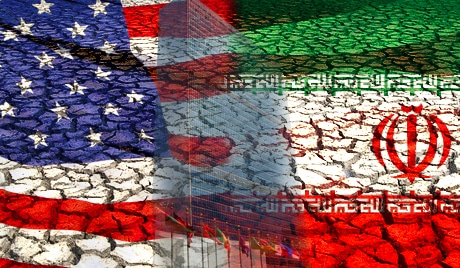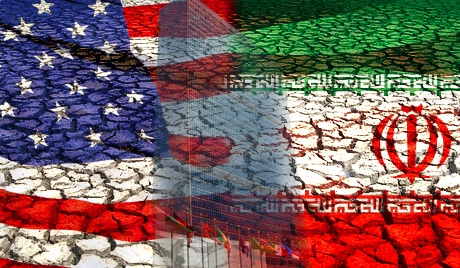Earlier this month, the US administration announced its decision to designate Iran’s Islamic Revolutionary Guard Corps (IRGC) as a Foreign Terrorist Organization (FTO). Just this week, the Trump administration said that it will no longer exempt any country from US sanctions if they continue to buy Iranian oil. These moves are justifiably sparking renewed debate about US strategy for Iran.
The White House portrays these steps as a natural progression in its ‘maximum pressure’ campaign to deprive Iran of “funds that it has used to destabilize the Middle East for decades.”
The reaction among policy pundits has been mixed but imminently predictable. Supporters of regime change in Iran, like Mark Dubowitz at the Foundation for the Defense of Democracies, have long pushed for such moves. On the opposing side, advocates of rapprochement such as Trita Parsi have sounded alarmist assessments indicating that the IRGC designation alone represents a dangerous escalation that might well lead to war. Still others see the combination of the IRGC designation and the imposition of crippling new sanctions as part of an orchestrated public information campaign to build a US case for war against Iran.
Meanwhile, others in the analytical community including Suzanne Maloney at Brookings have characterized the IRGC designation as an action that will ultimately prove to be of little consequence. Similarly, while the threat of additional US sanctions on countries importing Iranian oil have already predictably led to a short-term increase in oil prices, some oil analysts have suggested that the US drive to get Iranian oil exports to zero will ultimately fail and characterize such policies as more “feel-good rather than strategy-driven.”
Whichever side of this debate you find yourself, it is imperative to recognize that – whether by happenstance or design – these steps are dangerously degrading the pillars of a successful US deterrence strategy against Iran.
One of the most essential components of a successful US deterrence strategy is clear communications. As Thomas C. Schelling observes in his classic exposition of deterrence theory, “The victim has to know what is wanted, and may have to be assured of what is not wanted.” Unfortunately, the Trump Administration has failed on both counts. This continued uncertainty and lack of clarity in terms of US expectations for Iran’s behavior are the anti-thesis of what is required for a coherent and realistic deterrent policy.
In terms of what constitutes unacceptable behavior on Iran’s nuclear activities, President Trump’s unilateral withdrawal from the meticulously negotiated and internationally sanctioned Iran nuclear deal (formally named the Joint Comprehensive Plan of Action) has unnecessarily and recklessly muddied the waters. For now Iran continues to adhere to the terms of the JCPOA despite the re-imposition of stringent US unilateral and extraterritorial sanctions. But the basic terms of the deal which involved Iran agreeing to verifiable restraints on its nuclear activities in exchange for sanctions relief have been clearly violated and upended by the US itself. In the absence of the JCPOA’s promised rewards, it is only a matter of time before Iranian hardliners begin to test the limits of a severely weakened international agreement.
The Trump administration has offered no more clarity regarding Iran’s troubling behaviors outside the nuclear file. US Secretary of State’s purported New Iran Strategy announced in May 2018 contains a grab bag of demands including ending all enrichment activities, guaranteeing unrestricted access to any Iranian facilities whether military or civilian, halting all ballistic missile development, ceasing support to Iran’s regional proxies and militias, a full withdrawal of Iranian forces from Syria, and stopping all unspecified “threatening behavior.” This list of US expectations amounts to a demand for Iran to end efforts to exercise any influence outside its own borders. In an open letter, more than 50 former senior US government officials have dismissed these US demands as leaving “Iran the option of either capitulation or war.”
Moreover, this US approach fails to give any confidence to leaders in Tehran that any changes in its behavior will actually serve to avoid punishment or result in any measurable benefit. The US unilateral withdrawal from the JCPOA despite Iran’s compliance has reinforced perceptions among hardliners in Tehran that nothing short of wholesale regime change will satisfy leaders in Washington. Indeed, the rhetoric from senior Trump officials has taken an increasingly hostile tone since the US withdrawal from the JCPOA. In a speech in Cairo early this year, Pompeo cast Iran clearly as an “enemy” while offering US support for the Iranian people to rise up against “the mullahs in Tehran” as they did during the Green Revolution in 2009. Meanwhile, National Security Advisor John Bolton issued what some have reasonably interpreted as a direct threat to the regime on the 40th anniversary of the Iranian Revolution saying, “I don’t think you’ll have many more anniversaries left to enjoy.”
Additionally, the Trump administration’s unilateral approach to Iran has perilously undermined the credibility of its deterrent posture by fracturing the broad international coalition that had imposed a stringent set of multilateral sanctions that brought Iran to the negotiating table in 2015. Instead of a unified global or Western front focused on challenging Iranian transgressions, we are now witnessing European countries and other US allies devising financial mechanisms to expressly evade US sanctions on Iran. At the same time, what should be low-hanging fruit in terms of US efforts to forge an anti-Iran coalition among long-time US Arab allies is also collapsing of its own weight as most recently illustrated by Egypt’s withdrawal from the so-called ‘Arab NATO’ plan.
Finally, any strong deterrent posture runs the risk of provoking retaliatory steps by the targeted state which could set off an unpredictable tit-for-tat retaliatory escalation leading potentially to open conflict. The US and Iran appear to be engaged in just such a provocative and potentially dangerous exchange. In responding to the US designation of the IRGC as an FTO, Iran’s Supreme National Council retaliated by designating US CENTCOM and all its forces as terrorists. In response to US efforts to eliminate Iran’s ability to sell any oil on the international market, senior Iranian military officials have renewed threats to close the strategic Strait of Hormuz saying “If we are prevented from using it, we will close it.” The current atmosphere of intensifying tensions could lead to an unintended escalation that neither side is willing to walk away from.
The traditional measures essential to developing a successful deterrence include clear and consistent communications of what specific behaviors are acceptable and which actions will result in credible and punishing reprisals. Unfortunately, the steps taken thus far by the Trump administration have increased tensions with Iran and US allies alike, weakened international resolve to pose a united front against Iran, and do not present Iranian leaders with a viable path forward to avoid confrontation with the US Regrettably, this approach is far more likely to result in open conflict than to deter or curb undesirable Iranian behaviors.
Reprinted with permission from Sic Semper Tyrannis.


